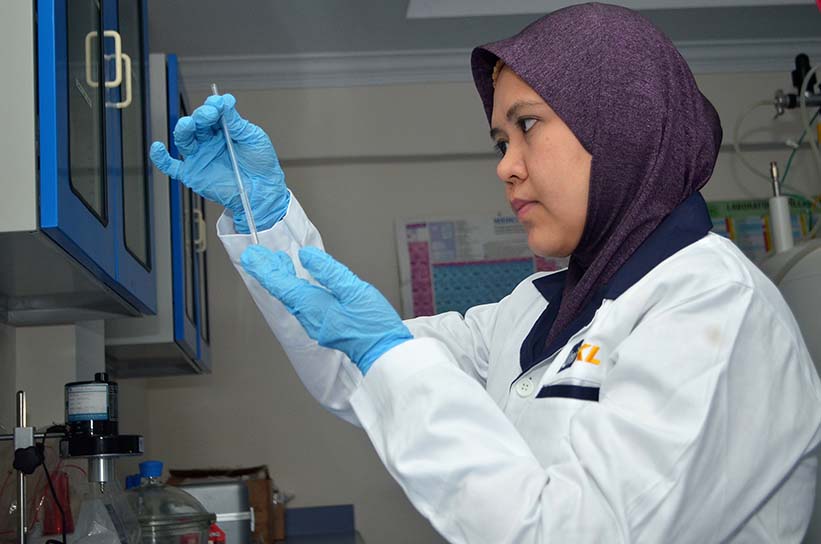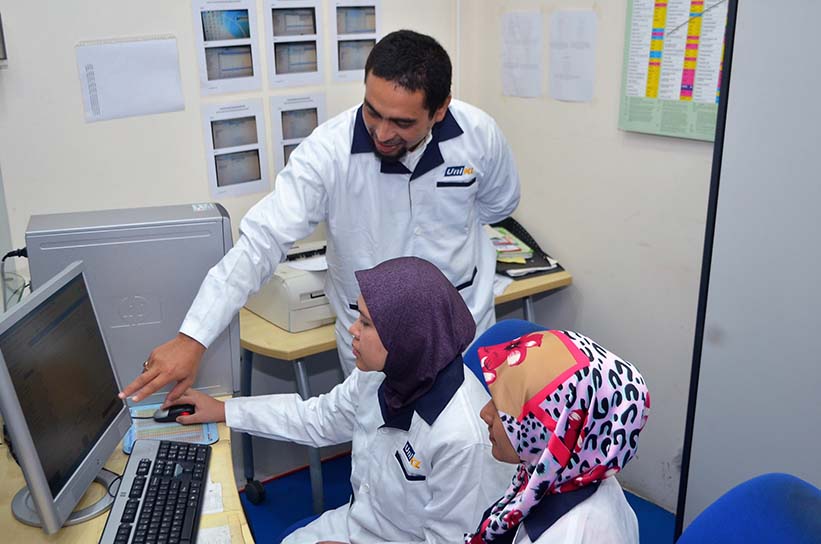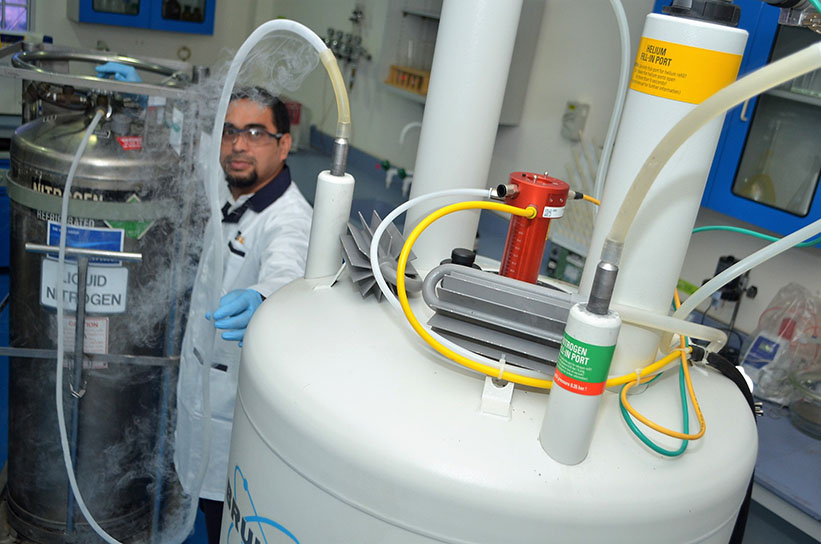Nuclear Magnetic Resonance (NMR)
Home > Academic > Technical Foundation
Nuclear Magnetic Resonance (NMR)
Welcome to the Nuclear Magnetic Resonance (NMR) Facility at the Section of Technical Foundation, Malaysian Institute of Chemical and Bioengineering Technology, Universiti Kuala Lumpur (UniKL MICET). The NMR facility located at the Pilot Plantbuilding, is equipped with one superconducting NMR spectrometers operating in liquid mode.
The goal of NMR facility, UniKL MICET is provide research support to undergraduate students, postgraduate students, academicians and researchers of the UniKL and other universities or institutes for advancement of their research.
Therefore, we offer services to both internal (UniKL) and external users. This equipment is operated hands-on by trained technical staffs. On site, Ph.D and technical staffs are ready to facilitate technical assistance and trainings.
The important characteristics of NMR spectroscopy which most favourable to the industries and research applications are some of the more common NMR active nuclei include 1H, 2H, 13C, 11B, 15N, 19F, 31P and 195Pt. In addition, only a small quantity of material is required for analysis such as sample sizes of 5-20 mg are generally sufficient for most NMR experiments and the sample preparation is simple and minimal. Typically, samples are simply dissolved in an appropriate solvent.
Introduction to NMR Spectroscopy and its applications
NMR spectroscopy is based on the measurement of absorption of electromagnetic radio-frequency region of roughly 4 to 900 MHz. In contrast to ultraviolet visible (UV-visible) and Fourier transform infrared (FT-IR) absorption, nuclei of atoms rather than outer electrons are involved in the absorption process. Furthermore, to cause nuclei to develop the energy states required for absorption to occur, it is necessary to place the analyte in an intense magnetic field.
A simple NMR experiment produces information in the form of a spectrum, which is able to provide details about the types of atoms, the relative amounts of atoms, the purity and composition of a sample and the structural information about constitutional and conformational isomerisation.
This analytical tool is one of the most powerful tools available to chemists, food chemists, and biochemists for elucidating the structure of chemical species. The technique is also useful for the quantitative determination of absorbing species.
NMR spectroscopy has applications in a wide range of disciplines and area of research such as:
- Organic, inorganic and physical chemistry
- Bioengineering and biochemical research
- Food chemistry
- Polymer industry
- Pharmaceutical development and production
Furthermore, commons applications of NMR spectroscopy are structure elucidation, chemical composition determination, raw materials fingerprinting, sample purity determination, compound identification and confirmation, analysis of inter-intramolecular structures, molecular characterization and reaction kinetics.
At the NMR facility, we are committed to providing students, postgraduate students, academicians and researchers with the best support services for your research and analytical projects. The services provided include:
1. Sample Analysis
This services is not limited to the internal users and we are welcome enquiries from all disciplines within the universities and institutes. The sample can sent to us for analysis by NMR spectroscopy.
2. Training
We also provide training to NMR users which held periodically throughout the year covering topics such as introductory of NMR spectroscopy, spectrometer operation and software applications.
We also encourage all UniKL MICET users of NMR must be licensed prior to using the spectrometers (internal only). For those new to NMR, training sessions are available.
For details about training, licensing and other services available, please email to Dr. Mohd Zulkhairi Abdul Rahim or Dr. Nor Nadiah Mohamad Yusof for more information about training and education assistance.
Instruction for sample submissions
- For External Users
1. The samples being sent from external users should be appropriately packaged and accompanied by a sample submission form (Link 1-External User-NMR submission form) and sent to the following address.
2. The sample must be fully soluble in the nominated solvent (D2O or CDCl3, DMSO-d6, C3D6O and etc.) for analysis to be possible.
3. It is beneficial for data collection and cost effectiveness to provide 50-100 milligrams of sample. Most NMR techniques are non-destructive, so samples can be returned to the client if requested. Throughput of samples will depend on the type of experiments required, as well as the amount of sample provided.
4. Additional charge will be added for sample preparation, NMR tube and solvent from our laboratory. Discount will be offered if using own tubes and solvent.
5. Routine analysis includes sample preparation, data collection, processing and report preparation. Results are typically provided as an electronic PDF version of the spectra recorded. Basic interpretation and processing such as integration and peak picking is also provided.
Please email to Dr. Nor Nadiah Mohamad Yusof if you have doubts about the solubility or solvent choose for your samples.
- For Internal Users
1. The samples should be brought to the NMR laboratory with the submission forms (Link 2-Internal User-NMR Submission form).
2. All samples must be appropriately stored and labelled. Sample containers that have inadequate labelling and inappropriately stored will not be handled by NMR technical staff.
3. For reservation slot, please visit the https://calendar.google.com/calendar/render?tab=mc&pli=1#main_7, the password can be obtained from NMR technical staff.
Please consult with NMR technical staff for reservation NMR analysis slot, using the NMR tube, solvents and preparing samples.
Type of Experiments
Typical experiments which are offered in our NMR Facility include:
1. NMR experiments of 1H and 13C, including basic processing and integration.
2. 2-D experiment for simple 1H-1H and 1H-13C 2D experiments (as requested) to fully characterize small molecules.
NMR Routine Rates
The following table shows the current price for external users.
|
Experiments |
Rates |
||
|
Government/IPTA |
Private/Industry |
International |
|
|
1 Dimensional |
|||
|
1H |
RM 100.00/sample |
RM 200/ sample |
USD 120/ sample |
|
13C |
|||
|
2 Dimensional |
|||
|
NMR 1H-2D (COSY) |
RM 200/ sample |
RM 300/ sample |
USD 150/ sample |
|
NMR 1H-2D (NOESY) |
RM 200/ sample |
RM 300/ sample |
USD 150/ sample |
|
NMR 13C-1D (DEPT, APT) |
RM 250/ sample |
RM 350/ sample |
USD 200/ sample |
|
NMR 13C-2D (HMQC) |
RM 250/ sample |
RM 350/ sample |
USD 250/ sample |
|
NMR 13C-2D (HMBC) |
RM 250/ sample |
RM 350/ sample |
USD 250/ sample |
(External Users)
Bench Fee for utilisation of Topspin software at NMR lab: RM 250.00
For UniKL users are charged on a cost-recovery basis according to spectrometer usage with solvents and tubes at cost. The information regarding internal rates for UniKL users can be found at the NMR laboratory or by contacting Dr. Mohd Zulkhairi Abdul Rahim or Dr. Nor Nadiah Mohamad Yusof.
Sample recovery and return
At the end of data collection, samples are stored for 30 days and then discarded. If requested, arrangements can be made to recover and return the sample to the customer for an additional fee.
- Dr. Nor Nadiah Mohamad Yusof
NMR Group Leader
Email : nornadiah@unikl.edu.my
Tel : 06 – 551 2085
- Mohd Fadil Mohd Amin
NMR Technical Staff
Email : fadil@unikl.edu.my
Tel : 06 – 551 2000
UNIVERSITI KUALA LUMPUR Branch Campus Malaysian Institute of Chemical & Bio-engineering Technology (UniKL MICET)
Lot 1988, Kawasan Perindustrian Bandar Vendor
Taboh Naning, 78000 Alor Gajah
Dr. Nor Nadiah Mohamad Yusof
NMR Group Leader
Email : nornadiah@unikl.edu.my
Tel : 06 – 551 2085
UNIVERSITI KUALA LUMPUR
Branch Campus Malaysian Institute of Chemical & Bioengineering Technology (UniKL MICET)
Lot 1988, Kawasan Perindustrian Bandar Vendor, Taboh Naning,
78000 Alor Gajah, Melaka.
+606 – 551 2000
+606 – 551 2001
CONNECT WITH #uniklmicetofficial







